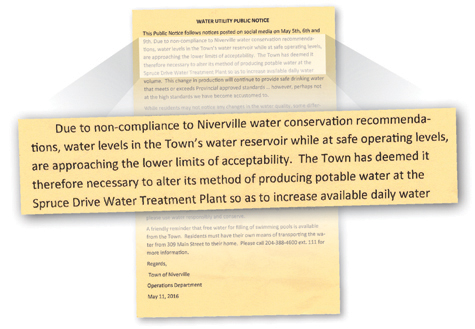
In early May, residents of The Highlands and Fifth Avenue Estates received repeated notices from town council regarding high levels of water usage. Residents were asked to reduce water consumption by alternating lawn-watering days and by picking up water for their pools from the town’s non-treated system.
Six days after the initial notice, council sent out a follow-up letter indicating that, due to noncompliance by residents, council was required to disconnect from the reverse osmosis (RO) filtration system at the Spruce Drive plant and chlorinate the water until levels returned to normal.
This apparent spike in water usage follows quickly on the heels of two other announcements made by council regarding water in the past two months. Residents connected to the plant will see a water rate hike as of July 1, 2016 and consecutive hikes in 2017 and 2018. An announcement was also made in April that the town will need to seek out another water source to improve our current water system.
Water has been at the forefront of issues facing Niverville this year, beginning in January when council announced the first phase of a five- to ten-year plan to integrate the entire town into the treated water system.
The recent sequence of events begs many questions. How is it that a water treatment plant specifically designed for the developments it serves can’t keep up? What is council’s plan to ensure it will sufficiently manage consumption when Main Street businesses and the balance of residents hook up? What incentive is there for residents currently on wells to buy into a water system that seems flawed?
Mayor Myron Dyck suggests that quantity of water is not the issue. Currently, the plant has two wells with the potential of a third well dug and ready for use. The aquifer from which we receive our groundwater is immeasurably large and sufficient for our needs.
The problem lies with the amount of micro-sediment in the existing well bank, an underground storage space from which the wells draw water.
“Essentially, [it’s] a big sand cavern,” says Dyck. “When you take water out of it too fast, the sand caves into the water and it needs to settle out.”
According to Dyck, the current RO filtration system can’t keep up when this happens. “These microns that it is filtering are 1/100 the width of a human hair. It is so refined. We can’t turn it up to its full capacity because it stirs the [ground water], creating more of this [micro-sediment] and essentially it just plugs everything up.”
At times like this, the filtration system is turned off and chlorine is added until the water has settled. Chlorine is provincially accepted as a safe means of purifying water for drinking, but it doesn’t eliminate the fine minerals responsible for discolouration of faucets and appliances.
Eight years ago, when the plant was originally built, engineers were relied upon to determine an adequately sized pump and filtration system for our rapidly growing community, as well as the best possible location for the well bank. Though the pumps and filtration system can easily handle a greater capacity than they are now, due to sediment they are only able to run at half capacity.
“I’m disappointed [with] the information that we got,” says Dyck. “You hire companies that tell you that they have experience with that type of project. I would have expected more.”
According to Dyck, the problem first came to light in August 2014 when consumption jumped from its typical level of 275,000 to 325,000 litres per day, doubling to between 600,000 and 700,000 litres per day. The spike was short-lived but became a wake-up call to council that, in spite of engineers’ assurances, the system couldn’t handle such demand.
Dyck says that town staff monitor water usage daily. They cannot be absolutely certain that the recent spike is connected to lawn watering, but staff have been asked to do what they can to determine the cause.
“Our water problems have been increasing for years, not just since last year when [we experienced] a shortage,” says a resident who uses treated water. “When my family first moved to town in 2006, our water rates were very reasonable, which is part of the reason we chose Niverville. Over the years, the town keeps increasing water rates and sewer rates, and property taxes have skyrocketed.”
The resident, who wished not to be named, is concerned that there is more going on than meets the eye. “I don't know a single person who actually watered their lawn this season, let alone in the [short] period the town gave for complying. I am extremely offended that the town is blaming the residents for watering their lawns too often when clearly that is not what is happening. I wish the town would take responsibility and admit that someone has misjudged what is expected of an average family water usage.”
The mayor says they will be moving forward with changes to our water services. To do this, they are required to get a license from the province. Acquiring this license requires a study through the Manitoba Water Services Board. The cost of this study is $800,000, half of which the government will subsidize. The first stage involves hiring a hydrologist to help identify better water bank sites. The target date for study completion is January 1, 2017.
Dyck says the plant will stay where it is. The definitive costs, after the license is received and a well bank located, will come from digging new wells and running the line from those wells to the plant. That line may need to run for miles if cleaner well banks can’t be found close to home. Enhancements may be necessary to the plant as well. This will be determined by the study. The risk of affecting the water table for private well owners in the process, according to Dyck, is too small to be a concern.
“We want to ensure that we have a master plan for the town and the best possible water available to the community for the long-term,” Dyck says. “What we have to do now will put us forward 20 [to] 50 years. We’re going to accept what is and deal with it.”
“The [cost of the] study and everything will come from current [water] consumers, not from general taxation,” says Eric King, Finance Administration Manager for the town. “We have the power to lend general tax money to water, but it must be repaid. We have not gone down that path, as currently there is sufficient money in water to pay for the study of the wells.”
In the interim and into the future, council asks that residents adhere to conservation requests.
“We’re somewhat spoiled here in Manitoba,” Dyck says. “When we think of places like California, they’re not just on water alternates, they’re on water bans. There’s months when you can’t water. Water is another resource that we have to properly manage. I would say that if we had ten times the capacity that we have now, that a policy of council would still be to ask residents to water on alternating days because it’s just the right thing to do as far as not being wasteful.”
As to the question of non-serviced residents being obligated to hook up to the treatment plant in the future, the mayor answers with a decisive yes. He suggests that the town will not be carrying any of the financial burden for that, unlike the recent agreement negotiated with the Main Street initiative.
“This council has no appetite for doing a project where it’s going to create that much controversy [again],” says Dyck. “It’s what happens in other communities. To assist with health and water suppression, there’s a cost to that.”
Dyck adds that many residents will see a drop in their home fire insurance when fire hydrants are installed near their homes, helping to buffer the cost of water hook-up.


















